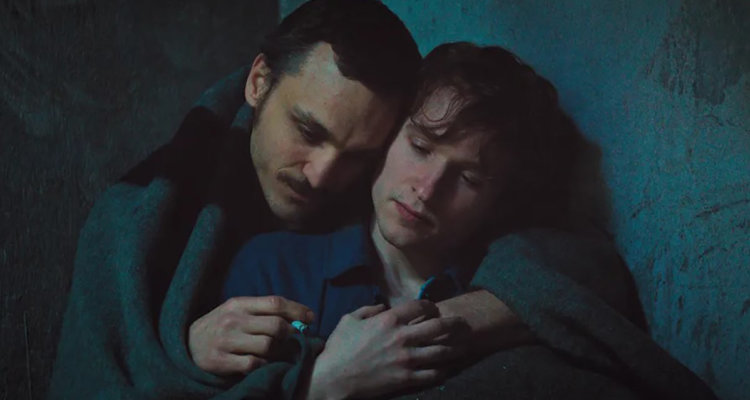Take a moment and imagine living in West Germany in July 1969. Like many around the world, you’re sitting in front of a television watching Neil Armstrong as he takes “a giant leap for mankind” by stepping on the moon. But you’re not watching this event from your home in Berlin or Munich. You’re watching from prison because you’ve been caught having consensual sex with another man. As surprising as that may seem to many, it is a historically accurate scene from Sebastian Meise’s new film “Great Freedom,” which debuted this week in the Un Certain Regard section of the 2021 Cannes Film Festival.
READ MORE: “The Hill Where Lionesses Roar” and take control of their destinies [Cannes Review]
Our incarcerated hero watching that landing is the scruffy, and wiry Hans (Franz Rogowski), and to put it simply, his existence has been stolen from him. Over the course of the film, Meise chronicles three different eras over the course of Hans’ life. We are first introduced to him in ‘69 when he’s been sentenced to 20 months for being caught having sex in a public restroom under the archaic auspices of Paragraph 175 of German law. Shockingly, this was not his first time in this particular prison. He first arrived in 1945, sent to finish a sentence after spending years in a Nazi concentration camp for homosexual activities. A decade later, in the late 1950s, he and a man we assume is the first love of his life, Oskar (Thomas Prenn), are jailed after being discovered together in public (a mistake that haunts Oskar immensely). Even more horrifying is how by the late ’60s he’s come to accept the “consequences” of his third conviction.
The one figure who continues to reappear in Hans’ life during these turbulent moments is his first cellmate, Viktor (Georg Friedrich). A convicted murderer, Viktor is at first repulsed by this “pervert,” but when he sees Hans’ concentration camp tattoo his tenor changes. Skittish and likely experiencing PTSD during this period, Hans takes Viktor up on his offer to tattoo over the numbers and an increasingly friendly bond is formed between them. By the time they reunite 24 years later, Viktor has already seen Hans suffer immense tragedy. And despite battling his own addictive demons, Viktor warns his friend of embarking on a love affair with Leon (Anton von Lucke), a teacher caught in the same restroom police sting.
Meise and Thomas Reider’s screenplay gives ample time to Hans’ relationships with both Leon and Oskar but is quizzically focused on the potential between Hans and Viktor, the latter of whom we believe to be assuredly straight. We’ll concede there are always welcome opportunities to explore sexual fluidity in cinema, but it feels somewhat obvious to do so in the context of an incarcerated setting yet again (see “Kiss of the Spider Woman,” “I Love You Phillip Morris,” among others). Especially as the affairs with Leon and Oskar have much significantly more dramatic potential. But despite its reductive nature, “Freedom” takes a turn down a road that is not as captivating as its filmmakers may have envisioned.
Luckily, the picture is steadied by the transfixing presence of Rogowski who once again continues to show immense talent after roles in films such as “Victoria” and “Undine.” He gives Hans a depth that often isn’t in the script and is masterful in portraying the character in such distinct periods of his life. Despite his valiant efforts, however, there is no chemistry of the manner Meise is hoping for between Rogowski and von Lucke on screen.
Despite a very frank and welcome illustration of gay sexuality rarely seen in modern media (in this manner at least), “Greater Freedom” continually teases us with storylines and subject matter by choosing to frame this era through a relationship that it cannot rationalize. A relationship that simply does not have enough depth from the events shown on screen. Meise and Reide exacerbate this with an ending that is so hard to believe it made this particular critic gasp in utter frustration. And frustration is the operative word.
There is so much about Meise’s feature you want to embrace. Rogowski’s performance front and center. A depiction of gay rights in Germany during this era that many across the world are still unaware of. That fact alone should make it worthwhile, but in the end, it feels like the film is taunting you. Goading you into accepting a choice you simply can’t believe. [C+]


